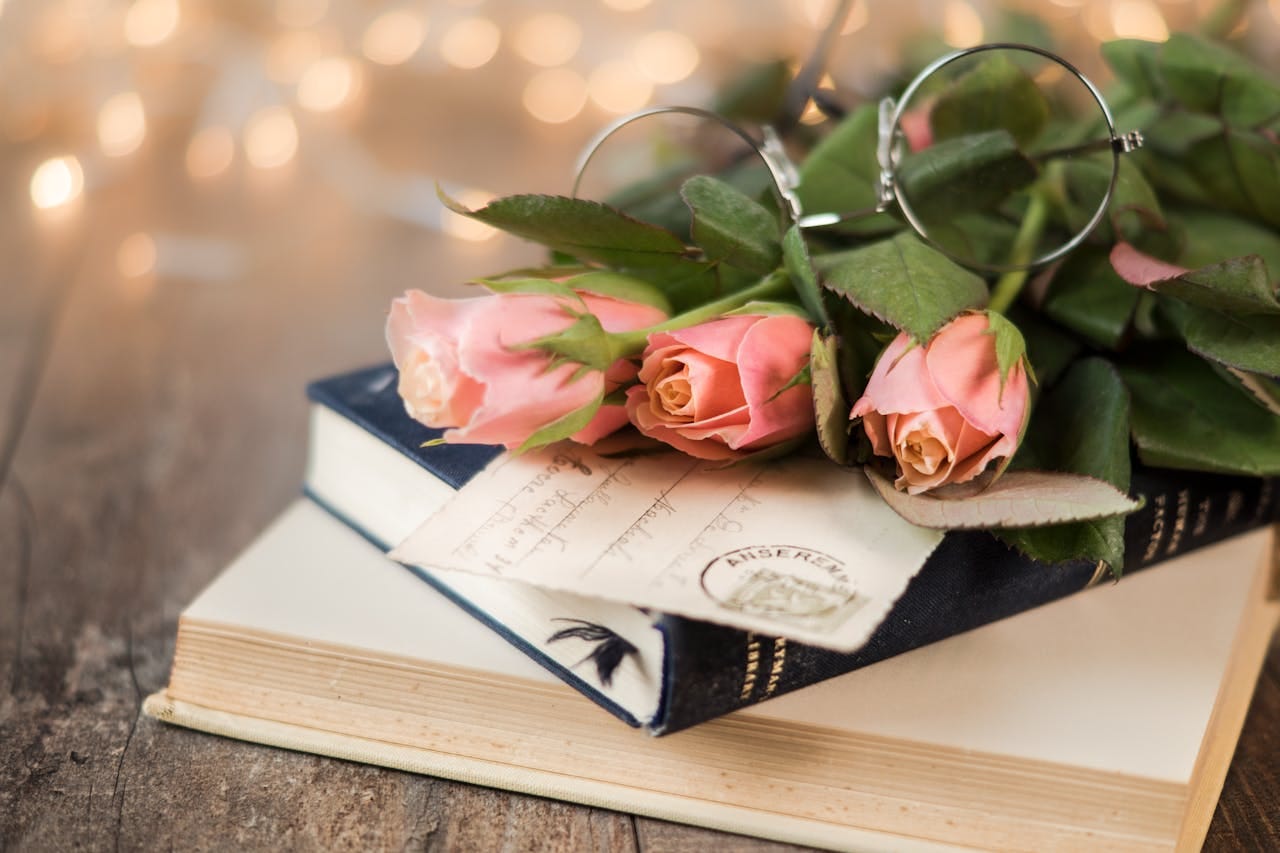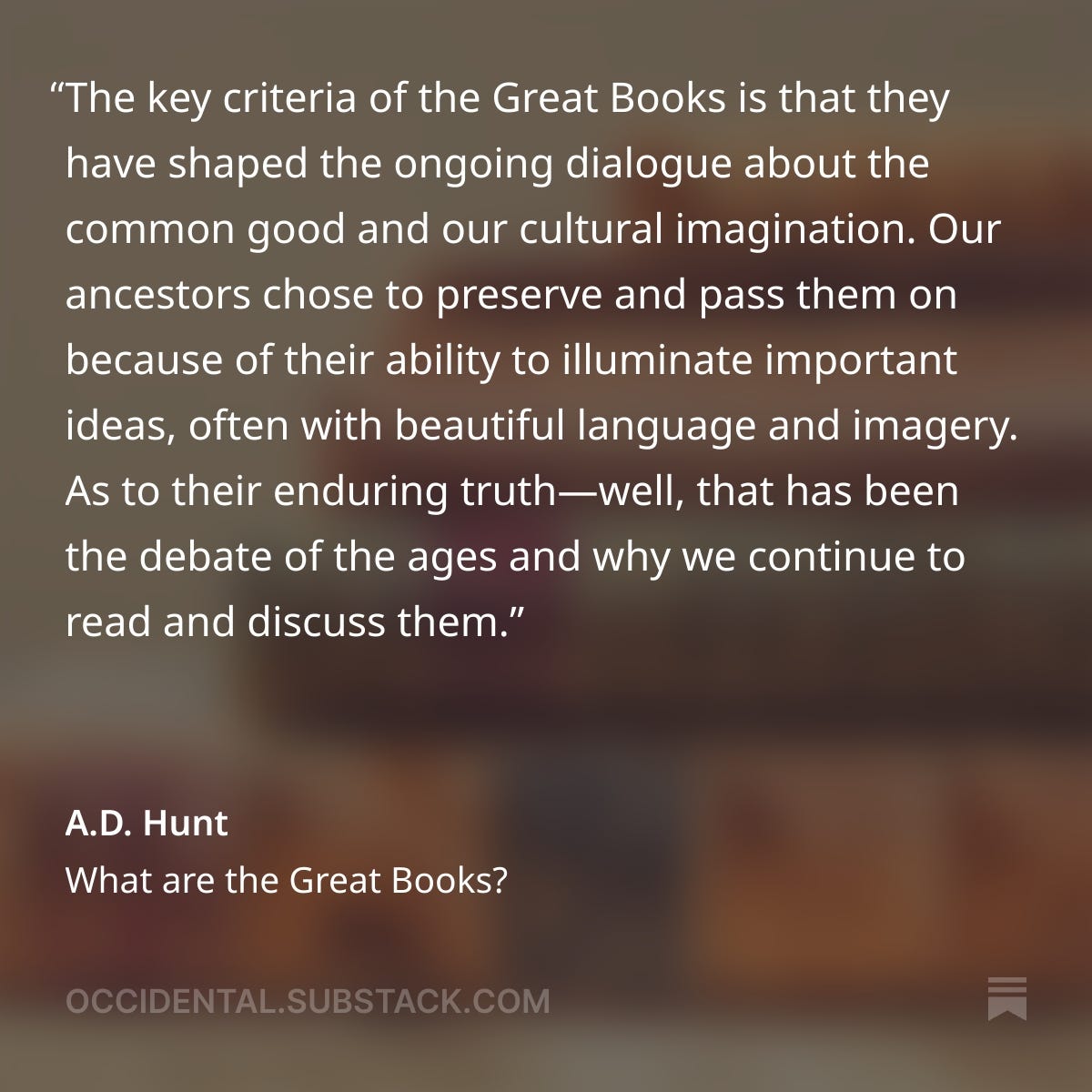"The Occidental Tourist" Turns Three!
A thank you to readers...with thoughts on re-enchantment and the road ahead.
Unlock the timeless wisdom of the West—join The Occidental Tourist for weekly free insights into the books and ideas that have shaped history, culture, and the human spirit!

This week marks the third anniversary of The Occidental Tourist! I want to take a moment to thank my readers and the wider Substack community for accompanying and challenging me during this intellectual and creative journey. Your interest, your questions, your engagement and support—these have been the steam that keeps my writing engine moving forward. I appreciate you!
How It Began
Three years ago, when I began to write, I was seeking to accomplish two things:
To process what I was reading and learning in my Online Great Books reading club.
To share the Great Books with a wider audience, doing my part to “preserve and pass on” the Great Tradition of the West.
But something more wonderful and unexpected happened along the way. Since 2016, I had been aware of the cultural attitude now widely known as disenchantment (a term borrowed from Charles Taylor’s A Secular Age). This is best described as a flattened, demystified sense of the world and of humanity’s place in it.
It wasn’t until I read the following passage from the court transcript of Joan of Arc’s heresy trial that I began to sense how vastly different the pre-modern worldview was from our own:
Near the village of Domrémy stands a certain large and ancient tree, commonly called ‘[the enchanted Fairy Tree] of Bourlemont,’ and near the tree is a fountain. It is said that round about it live evil spirits, called fairies, with whom those who practice spells are wont to dance at night, wandering about the tree and the fountain.1
Joan was interrogated repeatedly about this tree:
Question: “Did you not, in your childhood, play or dance around the Fairy Tree at Domrémy?”
Joan: “When I was a child, I sometimes saw the maidens and children dance there, but I sang more than I danced with them... I heard that people said fairies came there, but I do not know if it is true.”2

There is something disarmingly innocent and earthy in Joan’s response. Recall that she was a young woman of exceptional piety and simplicity who nevertheless held supreme command of France’s armed forces during a national existential crisis—leading them single-handedly to victory against a vastly superior English army.
What stirred me wasn’t whether she believed in the enchanted tree—it was that the possibility of such enchantment, the world of Faerie, existed for her in a way it rarely can for us today, regardless of our religious, philosophical, or scientific beliefs.
Recovering the Enchanted World
In On Fairy Stories, J.R.R. Tolkien famously wrote:
“Faerie contains many things besides elves and fays, and besides dwarfs, witches, trolls, giants, or dragons: it holds the seas, the sun, the moon, the sky; and the earth, and all things that are in it: tree and bird, water and stone, wine and bread, and ourselves, mortal men, when we are enchanted.”3
That idea redirected my reading and writing. I began to focus on recovering a sense of enchantment—not as imaginative nostalgia, but as metaphysical reality. And the only way to do that faithfully and rationally was to ask:
Does the cosmos have meaning—an inherent structure of purpose and givenness for the good of creation?
If so, what are the obstacles erected by modernity that prevent us from accessing that meaning… meaningfully?
Modern Obstacles to Meaning
Reading the Great Books has offered many clues. I don’t intend to reconstruct a complete historical narrative here, but in general, I found the following intellectual trends converging as early as the 15th and 16th centuries and gaining momentum during the Enlightenment: skepticism, rationalism, cynicism, empiricism, materialism, scientism, atheism, pragmatism, and scientific determinism.
While some of these frameworks boast real achievements—empiricism, for instance, laid the groundwork for the scientific method—our cultural tendency to elevate them into standalone epistemological paradigms has contributed to modern secular reductionism: the flattening of our worldview and the escalation of the so-called “meaning crisis.”
Three Practices That Helped
How have I begun to find my own way out of this mindset? Through three primary practices, which I hope are more or less evident in my writing:
1. Reading with a Hermeneutic of Charity
Reading chronologically through the works of Western literature has helped immensely, though it has meant setting aside modern prejudices and being willing to “stretch” my understanding in uncomfortable ways. I call this reading with a hermeneutic of charity—giving a dead author my full attention and striving to understand his meaning before evaluating or dismissing it.
2. Learning to Think Symbolically and Hierarchically
This is the project of Jonathan Pageau’s Symbolic World, with which many of you are likely familiar. What do things mean? Well, they mean themselves, of course—a rose is a rose—but they can also signify other things, and these patterns of symbolic meaning are nested within a Great Chain of Being. This is the important lesson of all mythology, poetry, and religion. The trick is realizing that it’s also the lesson of creation. Learning this requires time, silence, and direct engagement with reality—the opposite of screen time.
3. Recovering the Union of Form and Matter
In traditional metaphysics, this unity is called hylomorphism. It’s a simple concept you naturally encounter everywhere, and its rejection is one of the great losses in the modern world, especially in art and storytelling.
Take poetry: once dominated by structured forms like the sonnet or ballad, modern poetry now favors free verse, which dispenses with rhythmic discipline and formal constraints. Free verse has become the preferred modern soul of the poem, but by throwing off form, it has sacrificed something essential to poetic experience. To my mind, restoring the union of form and matter is one of the first steps in the process of re-enchantment.
Looking Ahead
So what’s in store for the coming year at The Occidental Tourist?
I’ll continue developing my series on Dante’s Divine Comedy and its literary antecedents as an itinerary of spiritual conversion. Next up: Biblical influences, followed by Ovid’s Metamorphoses.
This fall, I begin final coursework and thesis preparation for my M.A. in Humanities, where I’ll argue that J.K. Rowling’s Harry Potter series subverts the assumptions of the modern materialist worldview through a sacramental Christian mythos. This will involve research into the genre of Christian fantasy, literary alchemy, and medieval motifs—all of which I plan to share here.
I’ll also continue to publish a monthly study guide and post-discussion recap for paid subscribers following my Great Books reading club. We’re reading (more or less) along Adler’s Ten-Year Reading Plan, and will be covering the following works through year’s end:
Shakespeare’s Macbeth • Milton’s Areopagitica • Pascal’s Pensées • Swift’s Gulliver’s Travels • Voltaire’s Candide • Kant’s Fundamental Principles of the Metaphysics of Morals • Mill’s On Liberty • Nietzsche’s Beyond Good and Evil • Alfred North Whitehead’s Science and the Modern World
Once again, thank you for being part of this journey.
Please share any feedback—I'd love to know how I can make this a more rewarding experience for you.
“Internet History Sourcebooks: Medieval Sourcebook,” accessed April 22, 2025, https://sourcebooks.fordham.edu/basis/joanofarc-trial.asp.
Ibid, paraphrased.
“On-Fairy-Stories1.Pdf,” n.d., accessed April 22, 2025, https://coolcalvary.com/wp-content/uploads/2018/10/on-fairy-stories1.pdf.





Happy 3rd birthday and many more years of writing ✍️ for you! 🎂 ~~ mom 🥰
Looking forward to joining the journey.
Per your thoughts on the magical nature of Nature, David Hinton notes the difference between Western and Chinese writing as language in the West being mimetic: "words refer to things by pointing at them as if from some transcendental outside realm, the same realm in which the Western spirit-center seems to exist". Whereas the classic Chinese saw everything as conscious, with no "ontological separation between material reality and immaterial spirit-center". Hinton describes the ancient Chinese conception of the Cosmos as "awakened existence-tissue," something that words can fully capture and imbue so that poetry itself is a deep spiritual practice.
There is no real reason why Western literature and experience cannot be held in the same spirit, except for contemporary convention, which can easily be overturned.